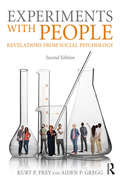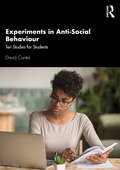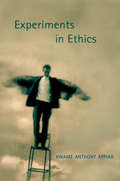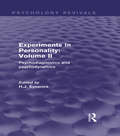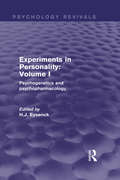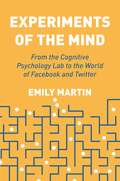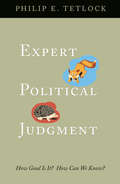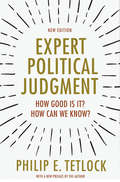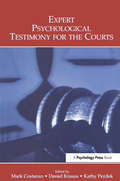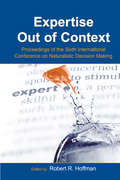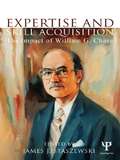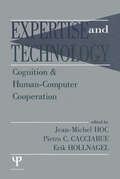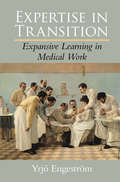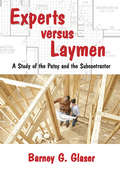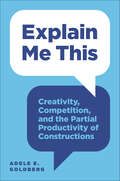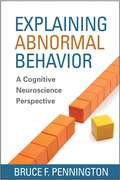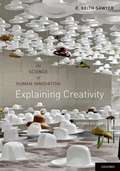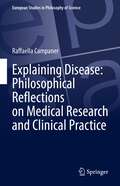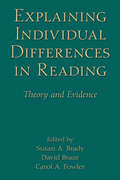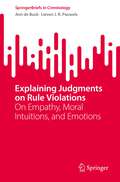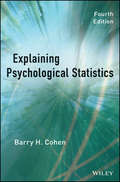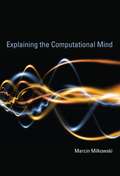- Table View
- List View
Experiments With People: Revelations From Social Psychology, 2nd Edition
by Aiden P. Gregg Kurt P. FreyThis book showcases 28 intriguing social psychological experiments that have significantly advanced our understanding of human social thinking and behavior. Each chapter focuses on the details and implications of a single study, while citing related research and real-life examples along the way. All the chapters are fully self-contained, allowing them to be read in any order without loss of coherence. This 2nd Edition contains a number of new studies and, together with its lively, conversational tone, it makes an ideal text for courses in social psychology, introductory psychology, or research design.
Experiments in Anti-Social Behaviour: Ten Studies for Students
by David CanterFor a practical, hands-on approach to learning forensic psychology, Experiments in Anti-Social Behaviour: Ten Studies for Students presents a collection of unique projects for students that illustrate the many ways research into anti-social behaviour can be conducted whilst also highlighting social psychological aspects of criminality. Drawing on over half a century of supervising many hundreds of projects at high school, undergraduate, masters, and doctoral levels, David Canter provides well-grounded and detailed guidance for students on how to execute a range of different research studies through several psychological approaches, including quantitative cognitive studies, qualitative discourse analysis, and social identity theory. After introducing the ethical and practical challenges of studying crime and criminality, Experiments in Anti-Social Behaviour outlines broad approaches to research. This is followed by ten practical studies for students to carry out in order to engage directly with experimental research. These studies cover experiments, surveys, and case studies, and include a controlled examination of how easy it is to forge a signature, descriptions of experiments trying to detect deception, and an exploration of what is involved in linking actions in a serial killer’s crimes to his characteristics. Both engaging and interactive, Experiments in Anti-Social Behaviour is an invaluable resource for instructors and students from colleges and universities around the world in many different fields, such as psychology, criminology, and socio-legal studies. It will also be of interest to all those who want to know more about the psychology of crime and criminality.
Experiments in Ethics (The Mary Flexner lectures #1)
by Kwame Anthony AppiahIn the past few decades, scientists of human nature—including experimental and cognitive psychologists, neuroscientists, evolutionary theorists, and behavioral economists—have explored the way we arrive at moral judgments. They have called into question commonplaces about character and offered troubling explanations for various moral intuitions. Research like this may help explain what, in fact, we do and feel. But can it tell us what we ought to do or feel? In Experiments in Ethics, the philosopher Kwame Anthony Appiah explores how the new empirical moral psychology relates to the age-old project of philosophical ethics. Some moral theorists hold that the realm of morality must be autonomous of the sciences; others maintain that science undermines the authority of moral reasons. Appiah elaborates a vision of naturalism that resists both temptations. He traces an intellectual genealogy of the burgeoning discipline of “experimental philosophy,” provides a balanced, lucid account of the work being done in this controversial and increasingly influential field, and offers a fresh way of thinking about ethics in the classical tradition. Appiah urges that the relation between empirical research and morality, now so often antagonistic, should be seen in terms of dialogue, not contest. And he shows how experimental philosophy, far from being something new, is actually as old as philosophy itself. Beyond illuminating debates about the connection between psychology and ethics, intuition and theory, his book helps us to rethink the very nature of the philosophical enterprise.
Experiments in Personality: Psychodiagnostics and psychodynamics (Psychology Revivals)
by H. J. EysenckOriginally published in 1960, the two volumes of Experiments in Personality report a number of experiments in psychogenetics, psychopharmacology, psychodiagnostics, psychometrics and psychodynamics, all of which formed part of the programme of research which had been developing from the late 1940s at the Maudsley Hospital. Presenting the studies together in a book, rather than the more usual route of journal articles, was itself felt to be an experiment at the time, especially given the wide area covered. The decision was deliberate because all the studies reported formed part of a larger whole, which would have been lost if published separately. Volume II looks at psychodiagnostics, psychodynamics and psychometrics.
Experiments in Personality: Psychogenetics and psychopharmacology (Psychology Revivals)
by H. J. EysenckOriginally published in 1960, the two volumes of Experiments in Personality report a number of experiments in psychogenetics, psychopharmacology, psychodiagnostics, psychometrics and psychodynamics, all of which formed part of the programme of research which had been developing from the late 1940s at the Maudsley Hospital. Presenting the studies together in a book, rather than the more usual route of journal articles, was itself felt to be an experiment at the time, especially given the wide area covered. The decision was deliberate because all the studies reported formed part of a larger whole, which would have been lost if published separately. Volume I looks at psychogenetics and psychopharmacology.
Experiments of the Mind: From the Cognitive Psychology Lab to the World of Facebook and Twitter
by Emily MartinAn inside view of the experimental practices of cognitive psychology—and their influence on the addictive nature of social mediaExperimental cognitive psychology research is a hidden force in our online lives. We engage with it, often unknowingly, whenever we download a health app, complete a Facebook quiz, or rate our latest purchase. How did experimental psychology come to play an outsized role in these developments? Experiments of the Mind considers this question through a look at cognitive psychology laboratories. Emily Martin traces how psychological research methods evolved, escaped the boundaries of the discipline, and infiltrated social media and our digital universe.Martin recounts her participation in psychology labs, and she conveys their activities through the voices of principal investigators, graduate students, and subjects. Despite claims of experimental psychology’s focus on isolated individuals, Martin finds that the history of the field—from early German labs to Gestalt psychology—has led to research methods that are, in fact, highly social. She shows how these methods are deployed online: amplified by troves of data and powerful machine learning, an unprecedented model of human psychology is now widespread—one in which statistical measures are paired with algorithms to predict and influence users’ behavior.Experiments of the Mind examines how psychology research has shaped us to be perfectly suited for our networked age.
Expert Political Judgment
by Philip E. TetlockThe intelligence failures surrounding the invasion of Iraq dramatically illustrate the necessity of developing standards for evaluating expert opinion. This book fills that need. Here, Philip E. Tetlock explores what constitutes good judgment in predicting future events, and looks at why experts are often wrong in their forecasts. Tetlock first discusses arguments about whether the world is too complex for people to find the tools to understand political phenomena, let alone predict the future. He evaluates predictions from experts in different fields, comparing them to predictions by well-informed laity or those based on simple extrapolation from current trends. He goes on to analyze which styles of thinking are more successful in forecasting. Classifying thinking styles using Isaiah Berlin's prototypes of the fox and the hedgehog, Tetlock contends that the fox--the thinker who knows many little things, draws from an eclectic array of traditions, and is better able to improvise in response to changing events--is more successful in predicting the future than the hedgehog, who knows one big thing, toils devotedly within one tradition, and imposes formulaic solutions on ill-defined problems. He notes a perversely inverse relationship between the best scientific indicators of good judgement and the qualities that the media most prizes in pundits--the single-minded determination required to prevail in ideological combat. Clearly written and impeccably researched, the book fills a huge void in the literature on evaluating expert opinion. It will appeal across many academic disciplines as well as to corporations seeking to develop standards for judging expert decision-making.
Expert Political Judgment: How Good Is It? How Can We Know?
by Philip E. TetlockSince its original publication, Expert Political Judgment by New York Times bestselling author Philip Tetlock has established itself as a contemporary classic in the literature on evaluating expert opinion. Tetlock first discusses arguments about whether the world is too complex for people to find the tools to understand political phenomena, let alone predict the future. He evaluates predictions from experts in different fields, comparing them to predictions by well-informed laity or those based on simple extrapolation from current trends. He goes on to analyze which styles of thinking are more successful in forecasting. Classifying thinking styles using Isaiah Berlin's prototypes of the fox and the hedgehog, Tetlock contends that the fox--the thinker who knows many little things, draws from an eclectic array of traditions, and is better able to improvise in response to changing events--is more successful in predicting the future than the hedgehog, who knows one big thing, toils devotedly within one tradition, and imposes formulaic solutions on ill-defined problems. He notes a perversely inverse relationship between the best scientific indicators of good judgement and the qualities that the media most prizes in pundits--the single-minded determination required to prevail in ideological combat. Clearly written and impeccably researched, the book fills a huge void in the literature on evaluating expert opinion. It will appeal across many academic disciplines as well as to corporations seeking to develop standards for judging expert decision-making. Now with a new preface in which Tetlock discusses the latest research in the field, the book explores what constitutes good judgment in predicting future events and looks at why experts are often wrong in their forecasts.
Expert Psychological Testimony for the Courts (Claremont Symposium on Applied Social Psychology Series)
by Mark Costanzo Daniel Krauss Kathy PezdekDuring the past two decades, the frequency and range of expert testimony by psychologists have increased dramatically. Courts now routinely hear expert testimony from clinical, cognitive, developmental, and social psychologists. Expert Psychological Testimony for the Courts provides a comprehensive, research-based analysis of the content, ethics, and impact of expert testimony. This book features leading scholars who have contributed to the scientific foundation for expert testimony and who have also served as expert witnesses. The opening chapter explores issues surrounding the admissibility of expert testimony, and the closing chapter explores the ethics and limits of psychological testimony. Each of the intervening chapters focuses on a different area of expert testimony: forensic identification, police interrogations and false confessions, eyewitness identification, sexual harassment, mitigation in capital cases, the insanity defense, battered women, future dangerousness, and child custody. These chapters describe the typical content of expert testimony in a particular area, evaluate the scientific foundation for testimony, examine how jurors respond to expert testimony, and suggest ways in which legal standards or procedures might be modified in light of psychological research. This groundbreaking book should be on the shelf of every social scientist interested in the legal system and every trial attorney who is likely to retain a psychologist as an expert witness. It can also serve as a text for advanced courses in psychology, legal studies, criminal justice, law, and sociology.
Expertise Out of Context: Proceedings of the Sixth International Conference on Naturalistic Decision Making (Expertise: Research And Applications Ser.)
by Robert R. HoffmanResearchers have revealed that real expertise, while applied to well-defined tasks with highly circumscribed contexts, often stretches beyond its routine boundaries. For example, a medical doctor may be called upon to diagnose a rare disease or perform emergency surgery outside his or her area of specialization because other experts are not availab
Expertise and Skill Acquisition: The Impact of William G. Chase (Carnegie Mellon Symposia on Cognition Series)
by James J. StaszewskiThe research on human expertise and complex skill acquisition that Wlliam G. Chase performed in the decade between publication of the classic chess studies he conducted with Herb Simon in 1973 and his untimely and tragic death has proven profoundly influential and enduring. Its impact spans disciplines that include Psychology, Computer Science, Education, Cognitive Neuroscience, Medicine, and Human Factors. It has contributed significantly to the emergence of Cognitive Engineering and has led to significant applications in the areas of training and instruction and knowledge-based "intelligent" computational systems. Its influence can be seen in current discussions of intelligence, heritability, intellectual potential, and achievement found in the contemporary popular press. The chapters in this volume document the enduring scientific contributions of William G. Chase to current knowledge and understanding of human expertise and skill acquisition and applications his work has supported. It will be of interest to those researching, studying, and working in the multiple fields that were greatly influenced by Chase's work.
Expertise and Technology: Cognition & Human-computer Cooperation (Expertise: Research and Applications Series)
by Erik Hollnagel Jean-Michel Hoc Pietro C. CacciabueTechnological development has changed the nature of industrial production so that it is no longer a question of humans working with a machine, but rather that a joint human machine system is performing the task. This development, which started in the 1940s, has become even more pronounced with the proliferation of computers and the invasion of digital technology in all wakes of working life. It may appear that the importance of human work has been reduced compared to what can be achieved by intelligent software systems, but in reality, the opposite is true: the more complex a system, the more vital the human operator's task. The conditions have changed, however, whereas people used to be in control of their own tasks, today they have become supervisors of tasks which are shared between humans and machines. A considerable effort has been devoted to the domain of administrative and clerical work and has led to the establishment of an internationally based human-computer interaction (HCI) community at research and application levels. The HCI community, however, has paid more attention to static environments where the human operator is in complete control of the situation, rather than to dynamic environments where changes may occur independent of human intervention and actions. This book's basic philosophy is the conviction that human operators remain the unchallenged experts even in the worst cases where their working conditions have been impoverished by senseless automation. They maintain this advantage due to their ability to learn and build up a high level of expertise -- a foundation of operational knowledge -- during their work. This expertise must be taken into account in the development of efficient human-machine systems, in the specification of training requirements, and in the identification of needs for specific computer support to human actions. Supporting this philosophy, this volume *deals with the main features of cognition in dynamic environments, combining issues coming from empirical approaches of human cognition and cognitive simulation, *addresses the question of the development of competence and expertise, and *proposes ways to take up the main challenge in this domain -- the design of an actual cooperation between human experts and computers of the next century.
Expertise in Transition: Expansive Learning in Medical Work
by Yrjö EngeströmThis book challenges standard notions of expertise. In today's world, truly effective expertise is built on fluid collaboration between practitioners from multiple backgrounds. Such collaborative expertise must also be transformative, must be able to tackle emerging new problems and changes in its organizational framework. Engeström argues that the transition toward collaborative and transformative expertise is based on three pillars: expertise needs to be understood and cultivated as a collective activity; expertise needs to be built on flexible knot-working among diverse practitioners; and expertise needs to be fostered as the expansive learning of models and patterns of activity that are in progress. In this book, Engeström recasts expertise as fluid collaboration on complex tasks that requires envisioning the future and mastering change.
Experts Versus Laymen: A Study of the Patsy and the Subcontractor
by Barney Glaser"This book studies the relationship and balance of power between experts and laymen. It is rooted in the author's analysis of customer and contractor interactions in the housing industry, but relevant to other kinds of expert-layman relationships. Many of the conflicts between customer and contractor noted by the author also occur in lawyer-client, student-teacher, and doctor-patient relations.The author's research is structured around three core categories pertaining to experts' relations with laymen: choosing experts, power symmetry, and what he calls ""elsewhereism."" The first category has to do with seeking experts, finding them, referrals, and judging whether or not to use experts. Power symmetry concerns the inherent imbalance of power between an expert and a layman. ""Elsewhereism"" focuses on the constant competition that laymen face with unseen others in claiming the time and services of an expert.Experts versus Laymen broadens the analysis of expert-layman phenomena far beyond similar studies. It examines processes of bidding, gaining information, inspecting and evaluating work, winning trust, bargaining over costs, and determining who has situational control. This book discusses not only the contracting process in the housing industry, but far more important a world of power and domination in expert-laymen relationships."
Explain Me This: Creativity, Competition, and the Partial Productivity of Constructions
by Adele E. GoldbergWhy our use of language is highly creative yet also constrainedWe use words and phrases creatively to express ourselves in ever-changing contexts, readily extending language constructions in new ways. Yet native speakers also implicitly know when a creative and easily interpretable formulation—such as “Explain me this” or “She considered to go”—doesn’t sound quite right. In this incisive book, Adele Goldberg explores how these creative but constrained language skills emerge from a combination of general cognitive mechanisms and experience. Shedding critical light on an enduring linguistic paradox, Goldberg demonstrates how words and abstract constructions are generalized and constrained in the same ways. When learning language, we record partially abstracted tokens of language within the high-dimensional conceptual space that is used when we speak or listen. Our implicit knowledge of language includes dimensions related to form, function, and social context. At the same time, abstract memory traces of linguistic usage-events cluster together on a subset of dimensions, with overlapping aspects strengthened via repetition. In this way, dynamic categories that correspond to words and abstract constructions emerge from partially overlapping memory traces, and as a result, distinct words and constructions compete with one another each time we select them to express our intended messages.While much of the research on this puzzle has favored semantic or functional explanations over statistical ones, Goldberg’s approach stresses that both the functional and statistical aspects of constructions emerge from the same learning mechanisms.
Explaining Abnormal Behavior
by Bruce F. PenningtonHighly readable and accessible, this book describes how research in cognitive science is transforming the way scientists and clinicians think about abnormal behavior. Bruce Pennington draws on work from multiple disciplines to identify compelling links among psychiatric, neurodevelopmental, and neurological disorders that are not generally studied together. Presenting cutting-edge work on the brain systems involved in key domains of neuropsychological functioning, Pennington sheds light on acquired neurological disorders like aphasia and amnesia, as well as the development of such conditions as schizophrenia, depression, dyslexia, autism, and intellectual disability. The book also reveals how the analysis of both typical and atypical brain-behavior relationships can contribute to a neural explanation of the self and consciousness.
Explaining Abnormal Behavior: A Cognitive Neuroscience Perspective
by Bruce F. PenningtonHighly readable and accessible, this book describes how research in cognitive science is transforming the way scientists and clinicians think about abnormal behavior. Bruce Pennington draws on work from multiple disciplines to identify compelling links among psychiatric, neurodevelopmental, and neurological disorders that are not generally studied together. Presenting cutting-edge work on the brain systems involved in key domains of neuropsychological functioning, Pennington sheds light on acquired neurological disorders like aphasia and amnesia, as well as the development of such conditions as schizophrenia, depression, dyslexia, autism, and intellectual disability. The book also reveals how the analysis of both typical and atypical brain-behavior relationships can contribute to a neural explanation of the self and consciousness.
Explaining Collective Violence in Contemporary Indonesia: From Conflict To Cooperation (Critical Studies of the Asia-Pacific)
by Mohammad TadjoeddinExplaining Creativity: The Science of Human Innovation
by R. Keith Sawyer<p>Explaining Creativity is an accessible introduction to the latest scientific research on creativity. The book summarizes and integrates a broad range of research in psychology and related scientific fields. In the last 40 years, psychologists, anthropologists, and sociologists have devoted increased attention to creativity; we now know more about creativity than at any point in history. Explaining Creativity considers not only arts like painting and writing, but also science, stage performance, business innovation, and creativity in everyday life. <p>Sawyer's approach is interdisciplinary. In addition to examining psychological studies on creativity, he draws on anthropologists' research on creativity in non-Western cultures, sociologists' research on the situations, contexts, and networks of creative activity, and cognitive neuroscientists' studies of the brain. He moves beyond the individual to consider the social and cultural contexts of creativity, including the role of collaboration in the creative process.</p>
Explaining Disease: Philosophical Reflections on Medical Research and Clinical Practice (European Studies in Philosophy of Science)
by Raffaella CampanerThis interdisciplinary monograph in philosophy of medicine examines models of explanation in health science and their relation with current medical trends, such as personalized and person-centered medicine. Medicine has provided challenging case studies for the general philosophy of science that have prompted rethinking of a wide range of philosophical notions – such as scientific law, theory and evidence – and contributed to the elaboration of pluralistic approaches to modeling, causality and explanation. The health sciences have increasingly recognized the role of philosophy of medicine as both a field of conceptual and methodological reflection, capable of addressing practical issues, and hence relevant for a proper understanding of the construction of medical knowledge, modeling practices, therapeutic strategies and preventive decisions.'Explaining Disease' contains various case studies in medicine to describe the assumptions underpinning the construction of explanatory models of diseases. It shows the impact different explanatory strategies can have on practical matters, which in turn affect clinical evaluation and therapy and public health decisions. The book concludes with a few open-ended reflections to foster more thorough consideration of the role of philosophy of medicine can play its dialogue with the health sciences. [this sounds wrong. Either: of the role of philosophy of medicine in its dialogue with the sciences, or: of the role philosophy of medicine can play in its dialogue with the health sciences.
Explaining Individual Differences in Reading: Theory and Evidence (New Directions in Communication Disorders Research)
by Susan A. Brady David Braze Carol A. FowlerResearch into reading development and reading disabilities has been dominated by phonologically guided theories for several decades. In this volume, the authors of 11 chapters report on a wide array of current research topics, examining the scope, limits and implications of a phonological theory. The chapters are organized in four sections. The first concerns the nature of the relations between script and speech that make reading possible, considering how different theories of phonology may illuminate the implication of these relations for reading development and skill. The second set of chapters focuses on phonological factors in reading acquisition that pertain to early language development, effects of dialect, the role of instruction, and orthographic learning. The third section identifies factors beyond the phonological that may influence success in learning to read by examining cognitive limitations that are sometimes co-morbid with reading disabilities, contrasting the profiles of specific language impairment and dyslexia, and considering the impact of particular languages and orthographies on language acquisition. Finally, in the fourth section, behavioral-genetic and neurological methods are used to further develop explanations of reading differences and early literacy development. The volume is an essential resource for researchers interested in the cognitive foundations of reading and literacy, language and communication disorders, or psycholinguistics; and those working in reading disabilities, learning disabilities, special education, and the teaching of reading.
Explaining Judgments on Rule Violations: On Empathy, Moral Intuitions, and Emotions (SpringerBriefs in Criminology)
by Ann de Buck Lieven J. PauwelsThis volume highlights the complex relations between empathy, individualizing and groupish moral intuitions, (anticipated) moral emotions, and moral judgment. It is rooted in the notion that human moral systems were not immune to evolutionary processes and thus shaped by biological and cultural evolutionary forces (e.g. natural selection, genetic drift, mutation, sexual selection, cultural mutation, ecological selection pressures, etc.). This edition proposes a conceptual model of both distal and proximal variables to integrate insights from Moral Foundations Theory with theorizing on commitment strategies by linking empathy and moral intuitions to moral emotions (guilt, anger, disgust), and moral judgment in the context of distinct moral violations. The proposed model is tested using data from a convenience sample of young adults in Belgium, who responded to written hypothetical scenarios in a large-scale online survey. This volume is ideal for moral theory researchers in criminology, psychology, and related disciplines
Explaining Psychological Statistics
by Barry H. CohenPraise for the previous edition of Explaining Psychological Statistics"I teach a master's level, one-semester statistics course, and it is a challenge to find a textbook that is at the right level. Barry Cohen's book is the best one I have found. . . . I like the fact that the chapters have different sections that allow the professor to decide how much depth of coverage to include in his/her course. . . . This is a strong and improved edition of an already good book." -Karen Caplovitz Barrett, PhD, Professor, and Assistant Department Head of Human Development and Family Studies, Colorado State University"The quality is uniformly good. . . . This is not the first statistics text I have read but it is one of the best." -Michael Dosch, PhD, MS, CRNA, Associate Professor and Chair, Nurse Anesthesia, University of Detroit MercyA clear and accessible statistics text- now fully updated and revisedNow with a new chapter showing students how to apply the right test in the right way to yield the most accurate and true result, Explaining Psychological Statistics, Fourth Edition offers students an engaging introduction to the field. Presenting the material in a logically flowing, non-intimidating way, this comprehensive text covers both introductory and advanced topics in statistics, from the basic concepts (and limitations) of null hypothesis testing to mixed-design ANOVA and multiple regression.The Fourth Edition covers:Basic statistical proceduresFrequency tables, graphs, and distributionsMeasures of central tendency and variabilityOne- and two-sample hypothesis testsHypothesis testingInterval estimation and the t distribution
Explaining Social Behavior
by Jon ElsterIn this new edition of his critically acclaimed book, Jon Elster examines the nature of social behavior, proposing choice as the central concept of the social sciences. Extensively revised throughout, the book offers an overview of key explanatory mechanisms, drawing on many case studies and experiments to explore the nature of explanation in the social sciences; an analysis of the mental states - beliefs, desires, and emotions - that are precursors to action; a systematic comparison of rational-choice models of behavior with alternative accounts, and a review of mechanisms of social interaction ranging from strategic behavior to collective decision making. A wholly new chapter includes an exploration of classical moralists and Proust in charting mental mechanisms operating 'behind the back' of the agent, and a new conclusion points to the pitfalls and fallacies in current ways of doing social science, proposing guidelines for more modest and more robust procedures.
Explaining the Computational Mind
by Marcin MilkowskiIn this book, Marcin Milkowski argues that the mind can be explained computationally because it is itself computational -- whether it engages in mental arithmetic, parses natural language, or processes the auditory signals that allow us to experience music. Defending the computational explanation against objections to it -- from John Searle and Hilary Putnam in particular -- Milkowski writes that computationalism is here to stay but is not what many have taken it to be. It does not, for example, rely on a Cartesian gulf between software and hardware, or mind and brain. Milkowski's mechanistic construal of computation allows him to show that no purely computational explanation of a physical process will ever be complete. Computationalism is only plausible, he argues, if you also accept explanatory pluralism. Milkowski sketches a mechanistic theory of implementation of computation against a background of extant conceptions, describing four dissimilar computational models of cognition. He reviews other philosophical accounts of implementation and computational explanation and defends a notion of representation that is compatible with his mechanistic account and adequate vis à vis the four models discussed earlier. Instead of arguing that there is no computation without representation, he inverts the slogan and shows that there is no representation without computation -- but explains that representation goes beyond purely computational considerations. Milkowski's arguments succeed in vindicating computational explanation in a novel way by relying on mechanistic theory of science and interventionist theory of causation.
